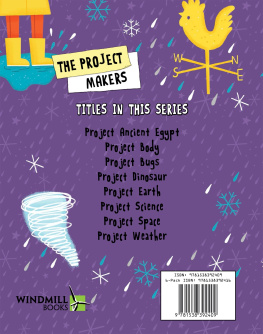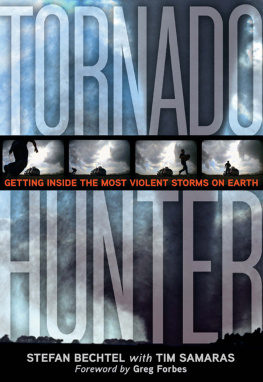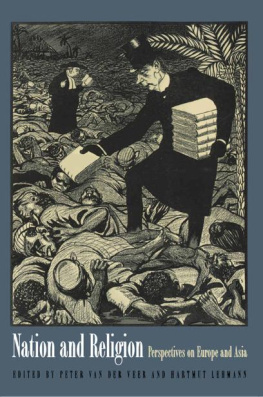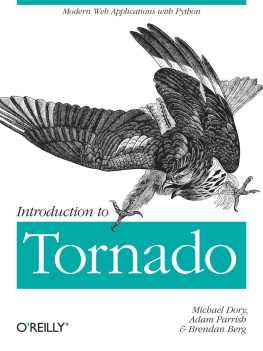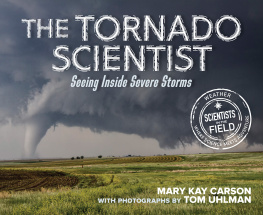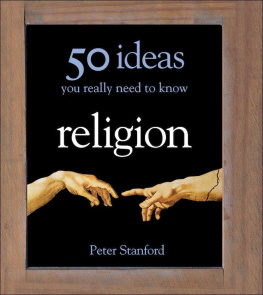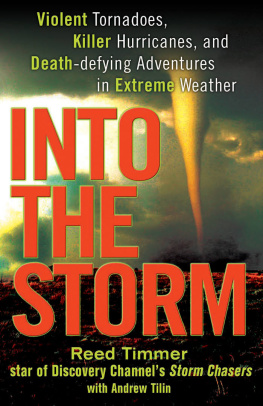Peter J. Thuesen - Tornado God: American Religion and Violent Weather
Here you can read online Peter J. Thuesen - Tornado God: American Religion and Violent Weather full text of the book (entire story) in english for free. Download pdf and epub, get meaning, cover and reviews about this ebook. year: 2020, publisher: Oxford University Press, genre: Religion. Description of the work, (preface) as well as reviews are available. Best literature library LitArk.com created for fans of good reading and offers a wide selection of genres:
Romance novel
Science fiction
Adventure
Detective
Science
History
Home and family
Prose
Art
Politics
Computer
Non-fiction
Religion
Business
Children
Humor
Choose a favorite category and find really read worthwhile books. Enjoy immersion in the world of imagination, feel the emotions of the characters or learn something new for yourself, make an fascinating discovery.
- Book:Tornado God: American Religion and Violent Weather
- Author:
- Publisher:Oxford University Press
- Genre:
- Year:2020
- Rating:5 / 5
- Favourites:Add to favourites
- Your mark:
- 100
- 1
- 2
- 3
- 4
- 5
Tornado God: American Religion and Violent Weather: summary, description and annotation
We offer to read an annotation, description, summary or preface (depends on what the author of the book "Tornado God: American Religion and Violent Weather" wrote himself). If you haven't found the necessary information about the book — write in the comments, we will try to find it.
Tornado God: American Religion and Violent Weather — read online for free the complete book (whole text) full work
Below is the text of the book, divided by pages. System saving the place of the last page read, allows you to conveniently read the book "Tornado God: American Religion and Violent Weather" online for free, without having to search again every time where you left off. Put a bookmark, and you can go to the page where you finished reading at any time.
Font size:
Interval:
Bookmark:


Oxford University Press is a department of the University of Oxford. It furthers the Universitys objective of excellence in research, scholarship, and education by publishing worldwide. Oxford is a registered trade mark of Oxford University Press in the UK and certain other countries.
Published in the United States of America by Oxford University Press
198 Madison Avenue, New York, NY 10016, United States of America.
Oxford University Press 2020
All rights reserved. No part of this publication may be reproduced, stored in a retrieval system, or transmitted, in any form or by any means, without the prior permission in writing of Oxford University Press, or as expressly permitted by law, by license, or under terms agreed with the appropriate reproduction rights organization. Inquiries concerning reproduction outside the scope of the above should be sent to the Rights Department, Oxford University Press, at the address above.
You must not circulate this work in any other form and you must impose this same condition on any acquirer.
Library of Congress Cataloging-in-Publication Data
Names: Thuesen, Peter Johannes, 1971 author.
Title: Tornado God : American religion and violent weather / Peter J. Thuesen.
Description: New York, NY, United States of America : Oxford University Press, 2020. |
Includes bibliographical references and index.
Identifiers: LCCN 2019047318 (print) | LCCN 2019047319 (ebook) |
ISBN 9780190680282 (hardback) | ISBN 9780190680305 (epub) | ISBN 9780190680312 (online)
Subjects: LCSH: DisastersReligious aspectsChristianity. | Tornadoes
Religious aspectsChristianity. | TornadoesUnited States.
Classification: LCC BT162.T67 T48 2020 (print) |
LCC BT162.T67 (ebook) | DDC 231.7dc23
LC record available at https://lccn.loc.gov/2019047318
LC ebook record available at https://lccn.loc.gov/2019047319
For my sister,
Sarah Caroline Thuesen
and in memory of my brother-in-law,
Scott Russell Clarke
(March 4, 1967November 1, 2015)
Like a tree planted by the rivers of water.
Psalm 1:3
i have been fascinated by the weather since childhood. One of my earliest memories is of being in my grandparents house in Dike, Iowa, when the tornado siren went off at night and we had to take refuge in the basement. My father had stayed behind at my aunt and uncles farmhouse out from town, and I wondered if he would get back safely. Though no tornado hit us that night, I still remember the frightening thought of a twister striking under the cover of darkness. I am sorry that my uncle, Neal Peter Thuesen, who had a farmers vested interest in the weather, did not live to see this book. My dad left the farm as a young man but remained a weather watcher, an obsessive trait that I inherited. I am profoundly grateful to my parents, Mary and Ted Thuesen, for their abiding love and support. I also thank my father-in-law, Jack Kenyon, for his helpful input on this project, and my late mother-in-law, Janie Kenyon, for her earlier encouragement.
Colleagues at Indiana UniversityPurdue University Indianapolis (IUPUI) have been wonderfully supportive. A sabbatical leave in Spring 2016 approved by Nasser Paydar (then our executive vice chancellor, now IUPUIs chancellor) and Bill Blomquist (then dean of the School of Liberal Arts) came at a critical juncture. Rob Rebein, the current dean of Liberal Arts, lent me a book about the 2007 Greensburg tornado in his home state of Kansas. I pledge to him to avoid tired jokes about Kansans and The Wizard of Oz. Our former dean and my religious studies colleague, Tom Davis, helped me clarify my arguments over morning coffee. Philip Goff, executive director of the Center for the Study of Religion and American Culture, shared my interest in Rudolf Otto and has promoted this endeavor from the beginning. Similarly, David Craig, chair of the Department of Religious Studies, was a constant cheerleader who helped with bibliography on the ethics of climate change. I thank my other colleagues in Religious Studies for offering suggestions through our faculty colloquium: Matthew Condon, Edward Curtis, Kelly Hayes, Andrea Jain, Joseph Tucker Edmonds, and Rachel Wheeler. I also acknowledge my emeriti colleagues Jan Shipps and Bill Jackson, who both share my love for Americana, and Ted Mullen, who offered bibliographical suggestions on storm gods of the ancient Near East. Similarly, I am grateful for the assistance and good humor of other Liberal Arts colleagues, past and present: Jon Eller, Art Farnsley, Amanda Friesen, Liz Goodfellow, Lisa Hoppes, Merle Illg, Joy Kramer, Edith Millikan, Lauren Schmidt, Mike Scott, Gen Shaker, Joy Sherrill, Brian Steensland, Thom Upton, Becky Vasko, Lauralee Wikkerink, Jeff Wilson, and Nate Wynne. At the IUPUI library, Teodora Durbin went the extra mile in tracking down missing microfilm. She and her colleagues also fulfilled my other interlibrary loan requests, even as I kept adding to the mountain of books I had already checked out from IUs own amazing collection.
Special thanks go to Lisa Sideris, the inaugural director of the Indiana University Consortium for the Study of Religion, Ethics, and Society, which awarded a grant for my research travel to Oklahoma. Lisas own work on environmental ethics proved helpful for this project, as did her enthusiasm for tornadoes. At IU Bloomington, I also appreciated Winni Sullivans ongoing interest in my progress, especially while we were both department chairs. Evan Haefeli, Joseph Blankholm, Courtney Bender, and the other members of the Religion in America Seminar at Columbia University provided a stimulating forum for an early proposal for the project in 2013. Mark Noll was a faithful supporter all along the way, as was Brooks Holifield. Ava Chamberlain and I exchanged e-mails about religion and the weather after lightning incinerated the Touchdown Jesus statue outside Cincinnati; I always enjoy her keen, wry insights. Sessions at the American Society of Church History in Atlanta (2016) and Washington (2018) gave me the chance to test out material for ; I thank my fellow participants James Byrd, Kathleen Flake, Kathryn Gin Lum, David Holland, Philippa Koch, and Mark Noll. I also thank Howie Bluestein at the University of Oklahoma for graciously agreeing to an interview and for sharing his collection of personal photos. Others who helped with illustrations include Laura Duncan, Jen Gall, Jon Gard, Ian Graham, Marilyn Kennett, Patty Marcano, Ken Minkema, Nick Quigley, Daniel Smith, Ben Stas, David Stiver, and Nicole Wholean. Judith Kerman kindly granted me permission to quote her poem, In Tornado Weather.
brings me full circle to one of his own teachers, Reinhold Niebuhr. Another Niebuhr enthusiast, Wayne Boulton, moved to Indianapolis and befriended me midway through my work on this book. Terminal illness did not shake Waynes Niebuhrian commitments. As Niebuhr himself once said in a sermon: A genuine Christian faith must move between those who claim to know so much about the natural world that it ceases to point to any mystery beyond itself and those who claim to know so much about the mystery of the unseen world that all reverence for its secret and hidden character is dissipated.
This is the third book I have completed under the editorship of Cynthia Read at Oxford University Press. I was but a lowly graduate student when I first met Cynthia, who appeared to me as a force of nature. Though I am now more comfortable in her presence, I remain in awe. The whirlwind of her energy and intellect has been a boon to the entire field of religious studies. I also salute the rest of the editorial and production team, including Drew Anderla, Prabhu Chinnasamy, Dorothy Bauhoff, Leslie Johnson, Cameron Donahue, and Salma Ismaiel. And heartfelt thanks to Sylvia Coates for preparing the index.
Font size:
Interval:
Bookmark:
Similar books «Tornado God: American Religion and Violent Weather»
Look at similar books to Tornado God: American Religion and Violent Weather. We have selected literature similar in name and meaning in the hope of providing readers with more options to find new, interesting, not yet read works.
Discussion, reviews of the book Tornado God: American Religion and Violent Weather and just readers' own opinions. Leave your comments, write what you think about the work, its meaning or the main characters. Specify what exactly you liked and what you didn't like, and why you think so.



